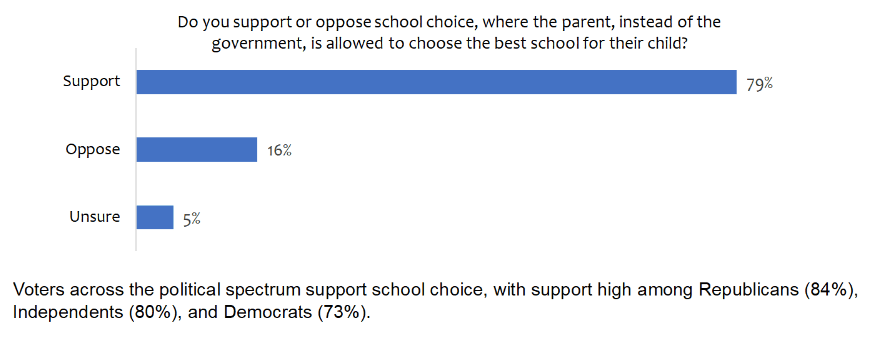This article first appeared on the Magnolia Tribune.
A recent poll of Magnolia State voters shows that 8 in 10 people support school choice, and the results are universal across Republicans, Democrats and Independents.
A recent poll found a majority of people in the Magnolia State support having the freedom to use state funding to educate their children the way they see fit.
The poll, which was conducted by Arc Insights for yes. every kid. foundation. from November 30 to December 3 of this year, found that nearly 8 in 10 voters, or 79% of the 600 people polled, support school choice.
Political affiliation did not affect the results. The poll showed that 84% of Republicans, 80% of Independents and 73% of Democrats support school choice.


Nearly three quarters of those polled indicated they would support an education saving account (ESA) system, of which 49% expressed strong support for ESAs.
Those respondents also stated they think school choice should be available to all families, not just those in low income households.
“By an overwhelming 7-to-1 margin, Mississippi voters are more likely to vote for a legislator if they support expanding ESAs in the state (49% more likely versus 7% less likely),” the release from yes. every kid. foundation. stated.


Support for open enrollment was also strong with those polled, showing 73% of the respondents support the ability for families to choose any public school for their child to attend. Currently within the United States, 33 states have some sort of private school choice program, while 13 have ESA programs, foundation vice president Matt Frendewey cited.
While Frendewey could not say for sure if Mississippi legislators will present a school choice bill in the upcoming session, he did say the results show parents strongly support a broad universal ESA program that can serve all families.
“What we see around the country and in the region, is that parents really value the opportunity to have freedom and flexibility to exercise more options,” Frendewey said.
Yes. every kid. foundation. works nationally to ensure children have access to programs, services, courses and schools that can meet each child’s interests and potential.
“We’re just true to our name. We believe that every kid is deserving of an education that meets their needs and provides them the skills and talents to live a life of purpose. So, we work on this issue throughout the country,” Frendewey added.
School choice in Mississippi still has some obstacles, such as the myth that one family being able to choose their child’s school will negatively affect other families. However, Fendewey said research conducted by the University of Arkansas, a state that also recently passed school choice, found outcomes for children improved after ESAs became available because it created an atmosphere where all students had access to better education.
“So, a lot of times it’s about a myth game. It’s kind of beating back those myths and then recognizing that, you know, choice is an individual matter. It’s an opportunity for people to choose to stay or to choose a new option for their child and we see that as a benefit in all things in life and we think that’s certainly better for an education,” Frendewey said.
Mississippi’s public schools receive a combination of state, federal and local funding (ad valorem taxes) to educate students. If the Legislature passed a school choice bill that allowed for ESAs, parents would potentially have access to the state funding allocated to their child that they can then use to educate their children however they see fit, while the remaining funding would stay with the school district.
Another myth surrounding school choice involves the perceived high cost of private schools, Frendewey stated.
The cost to send a student to a Mississippi private elementary school can average roughly between $6,000 to $6,400 for private high schools, according to Private School Review. Since state funding typically averages close to that same level, parents who choose to send their child to a private school may have to pay very little out of pocket, if anything, depending on the school they choose. Frendewey said some private schools may be cheaper, or more expensive, depending on several factors.
“We know that the myth is private school is significantly more than the per pupil funding. And the truth is, you know, the traditional private school is actually, oftentimes, less or near the per pupil funding,” Frendewey elaborated.
He clarified that there are private schools that cost a bit more, upwards of $8,000 annually.
“Now you’re always going to have the ones that are significantly higher, you’re going to have ones that are lower. This provides families the funds and freedom to find more options that may have otherwise been out of reach. I think it’s more important than just that, especially with an ESA, is it puts parents in the driver’s seat to customize their child’s education,” Frendewey added.
This article first appeared on the Magnolia Tribune and is republished here under a Creative Commons license.
Read original article by clicking here.

